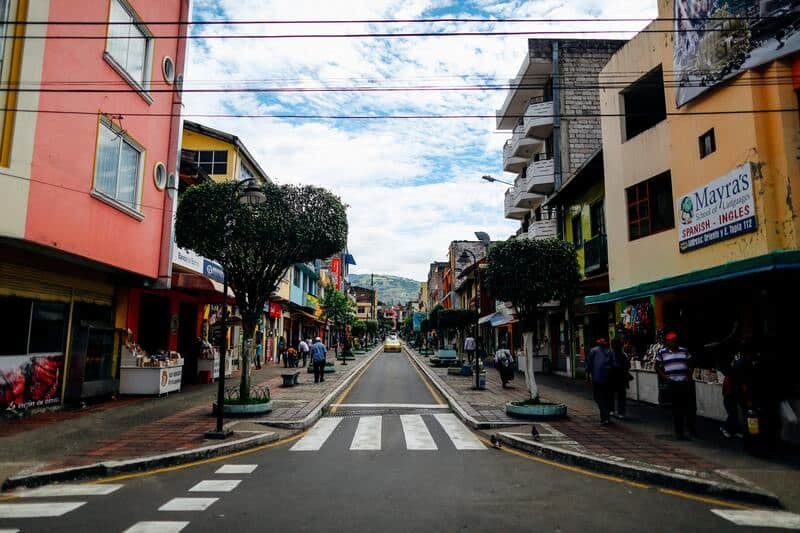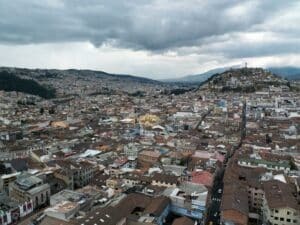Knowing how to retire in Ecuador has been one of top topics among people who are approaching their retirement age. The idea of retiring in a foreign country has become an attractive option for those looking to stretch their retirement savings and enjoy a new and exciting adventure.
Ecuador, in particular, has emerged as one of the most popular destinations for retirees, thanks to its low cost of living, comfortable climate, and rich cultural heritage.
But before making the decision to retire in Ecuador, it’s important to understand what this country has to offer and what challenges you may encounter along the way.
The purpose of this blog is to help retirees make an informed decision about retiring in Ecuador. We understand that making a big move like this can be daunting, but with the right information and guidance, it can also be an exciting and rewarding experience.
If you want to invest as an expat or high-net-worth individual, which is what I specialize in, you can email me (advice@adamfayed.com) or use WhatsApp (+44-7393-450-837).
Is Ecuador a good place to retire?
Yes, Ecuador can be a good place to retire for many people, depending on their individual needs and preferences.
For one, the country has experienced relative economic stability over the last few years, with steady growth in its gross domestic product (GDP). The cost of living is generally affordable, especially outside of major cities, which can be a significant advantage for retirees living on a fixed income.
Ecuador is home to a rich cultural heritage, with diverse communities that include Indigenous, Afro-Ecuadorian, and other ethnic groups. This diversity is reflected in the country’s music, art, and festivals, making it an exciting and unique place to live.
In general, Ecuador has a comfortable climate, with mild temperatures throughout most of the year. Additionally, the country is known for its natural beauty, with breathtaking landscapes that include the Andes Mountains, the Amazon rainforest, and the Pacific coastline. This can provide retirees with ample opportunities for outdoor activities and exploration.
Its public healthcare system is affordable and accessible to all, as well as private healthcare options for those who prefer them. Retirees can access quality medical care at a fraction of the cost of what they might pay in other countries.
Lastly, Ecuador offers a variety of financial incentives for retirees, including significant discounts on property taxes, income tax exemptions on foreign income, and a simplified residency process for those who meet certain criteria.

What are the pros and cons of retiring in Ecuador?
One of the most significant advantages of retiring in Ecuador is its affordability. The cost of living is relatively low, which can be a significant benefit for retirees on a fixed income.
Housing, transportation, and food are generally affordable, and healthcare is significantly cheaper than in many Western countries.
Ecuador is known for its comfortable climate, which can be particularly appealing to retirees looking to escape extreme temperatures. The country has a range of climates, from the hot and humid Amazon to the cool and temperate Andes Mountains.
The country also has a welcoming and friendly expat community, which can be a great resource for retirees looking to make new friends and connect with like-minded people.
However many Ecuadorians speak Spanish, which can be a challenge for retirees who do not speak the language. It may be necessary to learn some basic Spanish to get by.
While Ecuador is generally considered safe, crime rates can be higher in some areas, particularly in larger cities. Retirees should take precautions to stay safe and avoid areas that may be considered unsafe.
Additionally, although the country’s healthcare is affordable, the quality of care may not be up to the standards of Western countries. Some retirees may need to travel to larger cities for specialized medical care.
The bureaucracy in Ecuador can also be slow and frustrating, particularly when it comes to obtaining residency and navigating the legal system.
Infrastructure in some areas of Ecuador may also be limited, particularly in rural areas. This can mean that amenities such as internet access, public transportation, and healthcare facilities may be limited or non-existent.
What are the keys to a thriving retirement in Ecuador?
While there are many factors that can contribute to a thriving retirement in Ecuador, here are key factors that can make a big difference:
Affordable Cost of Living
Ecuador is known for its relatively low cost of living compared to many other countries, which can make it an attractive destination for retirees on a budget. Housing, food, transportation, and healthcare costs are all relatively affordable in Ecuador, especially outside of major cities.
Access to Quality Healthcare
It’s important for retirees to have access to quality healthcare, and Ecuador has a public healthcare system that is affordable and accessible to all, as well as private healthcare options for those who prefer them.
Comfortable Climate
Ecuador’s climate varies depending on the region, but generally speaking, the weather is comfortable year-round. Many retirees enjoy living in the Andes Mountains or near the coast, where temperatures are moderate and the scenery is beautiful.
Rich Culture and History
Ecuador is a country with a rich history and culture, and retirees who are interested in exploring local traditions, food, music, and festivals will find plenty to discover.
Welcoming Expat Community
Ecuador has a thriving expat community, which can be a great resource for retirees who are looking to connect with like-minded people and make new friends.
Safe and Stable Environment
Ecuador is generally considered to be a safe and stable country, and retirees can enjoy a sense of security in their daily lives.
Accessible Transportation
Ecuador has a well-developed transportation system, including buses, taxis, and regional airlines, which makes it easy for retirees to get around the country and explore new places.
How to retire in Ecuador?
Retiring in Ecuador can be a great option for those looking for an affordable, comfortable, and culturally rich experience.
Before making any major decisions, it’s important to do thorough research on Ecuador as a retirement destination. Consider factors such as the cost of living, climate, healthcare system, and cultural amenities.
To retire in Ecuador, you will need to obtain a visa. There are several types of visas available, including the pensioner visa, which requires proof of a minimum monthly income of $800 from a pension or other source.
Ecuador has a range of locations to choose from, each with its own unique culture, climate, and amenities. Consider factors such as access to healthcare, proximity to major cities, and cost of living when choosing a location.
Once you have chosen a location, it’s time to find housing. Ecuador has a range of housing options, from apartments to houses to villas. It’s important to consider factors such as affordability, accessibility, and safety when choosing housing.
Retiring in Ecuador can also be a great opportunity to get involved in the local community and make new friends. Consider joining local clubs or organizations to meet like-minded people.
Overall, retiring in Ecuador requires careful planning and research. However, with the right preparation and a willingness to embrace a new culture, it can be a rewarding and enriching experience.
What are the requirements to retire in Ecuador?
To retire in Ecuador, there are certain requirements that must be met.
For one, where there is no specific age requirement to retire in Ecuador, retirees must be at least 18 years old.
To retire in Ecuador, you must obtain a pensioner visa. This visa requires proof of a minimum monthly income of $800 from a pension or other source, such as an annuity or Social Security.
To obtain a visa, you will need to provide a criminal background check from your home country. The background check should be issued by the relevant government agency and be no more than six months old.
Retirees are also required to have health insurance while living in Ecuador. You can choose to use the public healthcare system, which is affordable and accessible, or obtain private health insurance.
In addition to the pensioner visa requirements, you will need to provide proof of income from all sources, such as bank statements, investment portfolios, or rental income.
You must also have a valid passport that will not expire for at least six months after your intended stay in Ecuador.
Lastly, you will need to provide proof of housing, such as a rental agreement or property deed, before obtaining a visa.
It’s important to note that visa requirements and regulations can change, so it’s essential to check with the Ecuadorian embassy or consulate in your home country for the most up-to-date information.

How much money is needed to retire in Ecuador?
The amount of money needed to retire in Ecuador will depend on your lifestyle, location, and personal preferences. However, Ecuador is known for being an affordable retirement destination, with a lower cost of living than many other countries in the region.
According to International Living, a couple can live comfortably in Ecuador on a budget of $1,500 to $2,000 per month, including rent. This budget would allow for a comfortable apartment or house, meals at local restaurants, and occasional travel and entertainment.
To break down the costs, rent in Ecuador can range from around $400 to $800 per month, depending on the location and size of the apartment or house.
Utilities, including electricity, water, and internet, can cost around $100 per month. Groceries can cost around $200 to $300 per month for a couple, with fresh produce being especially affordable.
Other expenses to consider include healthcare, which is generally affordable in Ecuador, and transportation. Many retirees find that they can get by without a car, as public transportation is efficient and inexpensive.
It’s important to note that these estimates are just guidelines, and your actual expenses will depend on your lifestyle and location.
However, many retirees find that they can enjoy a comfortable retirement in Ecuador on a relatively modest budget.
What are the best places to retire in Ecuador?
Ecuador offers a variety of options for retirees seeking a comfortable and affordable retirement destination. Here are some of the best places to retire in Ecuador:
Cuenca
Located in the southern highlands, Cuenca is a colonial city with beautiful architecture and a vibrant cultural scene. The city has a large expat community, excellent healthcare facilities, and a mild climate.
Quito
As the capital of Ecuador, Quito is a bustling city with plenty of amenities and a rich history. The city is home to many museums, theaters, and galleries, as well as beautiful parks and plazas. It also has a large expat community and good healthcare facilities.
Salina
For retirees seeking a beach lifestyle, Salinas is a popular option. Located on the Pacific coast, Salinas offers warm weather, beautiful beaches, and a relaxed lifestyle. The city has a range of amenities, including restaurants, bars, and shopping.
Cotacachi
Nestled in the Andean mountains, Cotacachi is a small town known for its leather goods and artisanal crafts. The town has a friendly and welcoming atmosphere, and is home to a growing expat community. It also offers stunning views of the surrounding mountains and countryside.
Vilcabamba
Located in the southern Andes, Vilcabamba is known for its natural beauty and laid-back lifestyle. The town is surrounded by lush forests and mountains, and is home to many organic farms and wellness centers. It has a small expat community and a range of amenities, including restaurants and cafes.
These are just a few of the best places to retire in Ecuador, and there are many other options to explore. It’s important to visit different areas and explore the local culture and lifestyle before making a decision on where to retire.

Is it safe to retire in Ecuador?
Ecuador is generally considered a safe country for retirees, with a low crime rate compared to many other countries in the region. However, like any country, there are some safety concerns that retirees should be aware of.
Petty theft, such as pickpocketing and purse-snatching, can occur in crowded tourist areas and on public transportation. It’s important to take precautions, such as keeping valuables out of sight and using a money belt.
It’s also advisable to avoid walking alone at night in urban areas, and to take taxis rather than public transportation after dark.
In recent years, there have been some isolated incidents of violent crime targeting tourists and expats. It’s important to stay informed of local news and to avoid areas that are known to be high-risk.
Overall, however, many retirees find that Ecuador is a safe and welcoming country to retire in.
By taking common-sense precautions and being aware of the local risks, retirees can enjoy a comfortable and secure retirement in Ecuador. It’s always a good idea to consult with a local expert or expat community before making any decisions.
Conclusion
In conclusion, retiring in Ecuador offers many advantages for those seeking an affordable and welcoming destination.While there are some challenges to retiring in Ecuador, many retirees find that these are outweighed by the benefits.
Whether you’re looking for a new adventure, a change of pace, or a chance to enjoy your golden years in peace and tranquility, Ecuador offers something for everyone.
With its friendly people, welcoming culture, and beautiful landscapes, it’s easy to see why so many retirees are choosing to call Ecuador home. So why not take the plunge and start your new life in this beautiful and vibrant country? You won’t regret it!
Pained by financial indecision? Want to invest with Adam?

Adam is an internationally recognised author on financial matters with over 830million answer views on Quora, a widely sold book on Amazon, and a contributor on Forbes.



